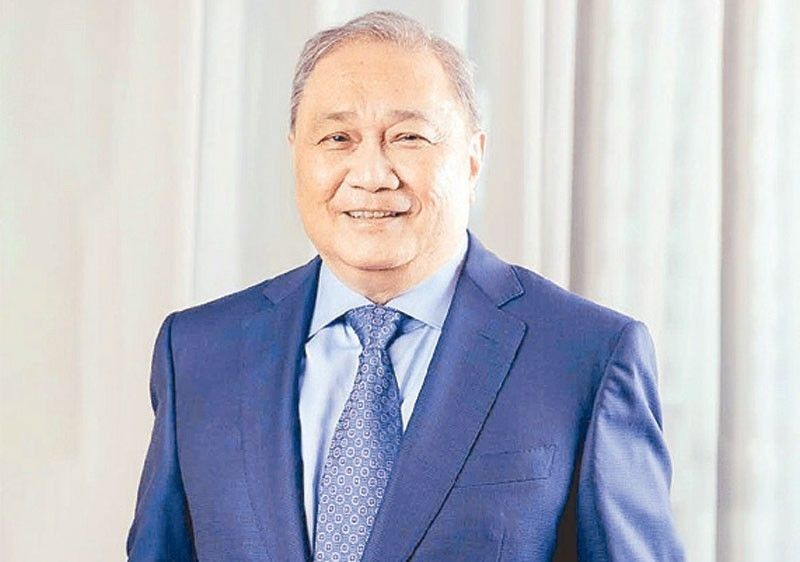‘MVP on PLDT budget mess: We’re not hiding anything, not playing with the truth’

MANILA, Philippines —Tycoon Manuel V. Pangilinan appeared calm as he led his executives when they faced analysts and fund managers last week at Dusit Thani Manila to explain why PLDT Inc., the listed telco giant he chairs, incurred a P48-billion budget overrun.
“This session does not give us undiluted pleasure, right? But we’re being transparent – totally transparent to you guys. There’s nothing we’re hiding here. We’re not playing with the truth,” Pangilinan said in response to a question from the audience, in what seemed like a bull session with puzzled analysts.
The tightly guarded meeting, which was closed to the media, took over two hours, but Pangilinan answered the questions in great detail, explaining what led to the budget mess.
He was firm and confident when he explained that there was no fraud or anomalous transactions that happened. He also maintained that there was no lapse in the control processes in PLDT’s systems.
Taking full responsibility
Nevertheless, the PLDT chairman took full responsibility for what happened.
“Nobody is shirking responsibility. I take command responsibility and Al (Panlilio) is also taking responsibility for that oversight. But when people allege that there are no control processes in place, that’s not right. It is simply not right,” Pangilinan said.
How did the overrun happen?
A confluence of factors led to the budget overrun, starting with the basic fact that the telco giant had over-ordered massive telco network equipment, Pangilinan said.
By the time some of these big-ticket equipment arrived or were ordered, the business environment had changed, no thanks to the dizzying speed by which technology evolves, industry sources said.
“What has happened is actually we have over-ordered quite a bit of equipment,” Pangilinan said.
Two incidents
There are two incidents that happened, PLDT chief legal counsel and corporate secretary Marilyn Victorio-Aquino said during the briefing.
The first is the rollout of the 5G or fifth-generation technology standard for broadband cellular networks.
Cellular phone companies across the globe began deploying this worldwide in 2019 as the successor of the 4G networks, which provide connectivity to most current cell phones.
“We ordered the hardware (but) the initial rollout did not attract a lot of users. So we decided to stop the rollout,” Victorio-Aquino said.
The 5G hardware, already in PLDT’s warehouses, however, will be repurposed for 4G rollout next year because the same hardware will be used, she explained.
PLDT president and CEO Alfredo Panlilio said the slow rollout of the 5G network happened globally.
“5G adoption has been very, very slow. So there was a major (pushback) in those 5G. We’re not stopping it, but we’re choosing the areas, but the focus now really will be on 4G LTE, where the majority of our customers – 80 percent to 90 percent – are. And there are areas where capacity is an issue. Congestion is happening. So it will be a very targeted expansion for 4G LTE, for sure. 5G (rollout) has slowed down, but very targeted only,” Panlilio said during the briefing.
The second incident, said Victorio-Aquino, is related to the common towers. PLDT had to change its business plans regarding the common tower, she said.
Specifically, PLDT had to cancel towers it ordered as it had to shift to BTS or build-to-suit towers.
Originally, PLDT was planning to have 61 towers built by Huawei and 54 towers built by Ericsson.
“But in the process, along the way, we decided to sell our towers and include a commitment for BTS sites — build-to-suit – by the buyers,” Victorio-Aquino said.
Thus, since PLDT had a commitment of roughly 1,500 BTS towers, it had to cancel its orders made with Huawei and Ericsson.
Vendor processes, transport, site rollout
There are other related factors that caused the budget overrun, according to company executives.
Pangilinan said they decided to roll out the 5G network in late 2020 but decided in 2021 to go slow on it or “not be as aggressive.”
There was a bit of a problem with this, too, because when a telco orders from vendors, there’s a lead time for this kind of equipment.
Other factors include transport costs, site rollout and the fiber-to-the-home build out, PLDT officials said during the briefing.
The explanation of PLDT on the spending issue is consistent with the view also expressed by Pangilinan’s fierce business rival Ramon Ang.
Ang said it was more of a procurement and impairment oversight and that he does not believe there was fraud or anomalous transactions.
Superior network
At the root of the oversight was a bold ambition to become a superior network.
Philstocks Financial Inc.’s Japhet Tantiangco, said there was “the desire to regain leadership.”
Panlilio said among the factors that led to the overrun were: PLDT having to regain network leadership following years of underinvestment in CAPEX; the threat from former President Rodrigo Duterte for telcos to shape up; intense competition in the telco sector with the then anticipated entry of DITO funded by China Tel, as well as the emergence of a competitor in the fiber space, Converge.
He said the COVID-19 pandemic and the resultant lockdowns and quarantines, which required the installation of speedy fiber connections in millions of households for work and school, pushed network teams to fast-track rollouts.
Next steps
Moving forward, Pangilinan said there would be changes to address the spending issue. At present, the telco giant is doing what it can to reduce the P48 billion overspend.
It is also negotiating with four major equipment vendors for deferred payment terms in relation to the P48 billion overspending.
“Whatever the agreed number with them among the four major vendors, we will ask for deferred payment terms. So that should ease the impact of the cash flow of the company moving forward and ask for a no-interest element to the final number of this budget overruns,” Pangilinan said.
The target is to finalize discussions and documentation with the vendors by early 2023.
PLDT is also looking at how to improve the operational aspects of procurement and network projects “to avoid a repeat of this incident,” Pangilinan said.
The company is also implementing a reorganization in three of its business groups namely network, procurement and finance.
Overall, it said business remains healthy and has not been significantly affected.
“We are on track to achieve EBITDA numbers of at least P100 billion for the year as we have originally indicated. CAPEX will be between P95 billion and P97 billion from our guidance of P85 billion, partly because of the foreign exchange element, although that has mitigated in the past few weeks. And acceleration in selected capex to ensure no delay in completion of certain critical projects,” Pangilinan said.
PLDT also plans to reduce fresh CAPEX starting in 2023.
“Thereafter, we expect CAPEX to reduce steadily. 2023 will be a year of consolidation as we continue to strengthen and grow the business. We strive to be better,” said Panlilio.
Pangilinan likewise assured investors that PLDT is maintaining its dividend payout despite what happened.
“[W]hen you sum it up, regular dividends for -- out of 2022 income will be P92 per share, representing 60 percent of telco core per share and P42 per share of the special dividends. So total dividends will be P134 per share, representing 88 percent of the EPS for the year,” Pangilinan said.
Analysts are digesting PLDT executives’ explanations and are also waiting for more details.
Panlilio said the company would continue to be transparent and disclose additional details along the way.
Waiting for the dust to settle
Michael Ricafort, chief economist at Rizal Commercial Banking Corp. said: “The markets have been digesting these recent developments, waiting for the dust to settle to provide a clearer picture as more details are disclosed. This is offset by its relatively larger net income to make up for the reported overruns as well as the recent gains on the sale of telco towers as reported in recent months.”
Shareholders are likewise waiting for the full results of the internal investigation.
Over the long term, only time will tell whether or not Pangilinan, now 76, will implement more drastic changes in his telco empire to move the company forward.
Last week, a day after PLDT’s share price plunged by a record 19 percent, Pangilinan tweeted that his arowana had died.
The freshwater fish is considered by the Chinese and the Asian elite as a bearer of good fortune. Its death is said to be a noble sacrifice that takes away the bad luck or misfortune that has befallen a household or perhaps a business.
“Probably absorbed all the angst of PLDT on our behalf,” Pangilinan quipped a day after PLDT shares plunged to P1,192 per share on Dec. 19.
At the end of the briefing, Pangilinan said he does not know exactly how to feel.
“I just don’t know how to feel. Certainly, not feeling like Ateneo winning, more like UP losing, right?”
The basketball patron was referring to the UAAP Championship Season 85 when the Ateneo Blue Eagles beat the UP Fighting Maroons for the coveted championship title.
It’s now up to Pangilinan how he will lead PLDT for a big comeback from the budget mess, the increasingly tight competition in the telco industry and the rapid technological changes.
Just like in a basketball game, anything can happen and one wrong move can spell the difference between winning and losing.
- Latest
- Trending































